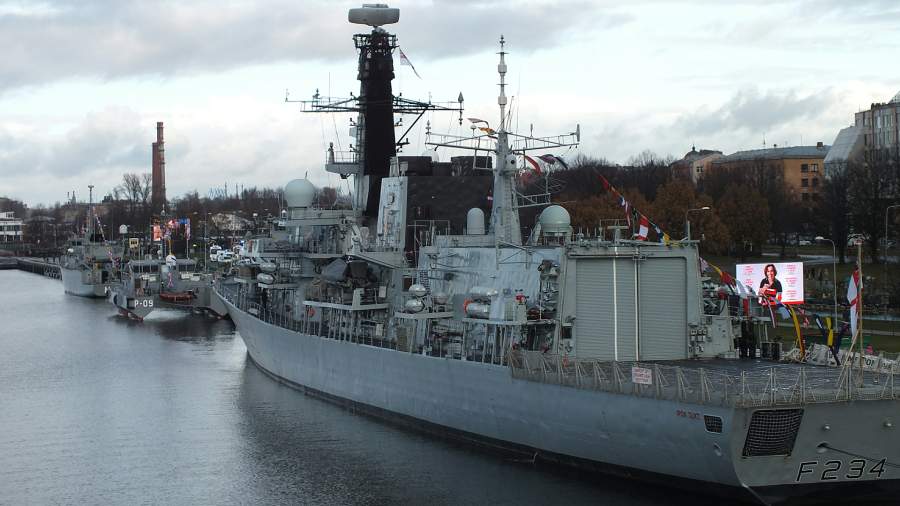Maritime intrigue: NATO countries seek to inspect ships in neutral Baltic waters

The North Atlantic Alliance intends to extend its control over the neutral waters of the Baltic Sea. This was announced by Polish Prime Minister Donald Tusk after the end of the summit of NATO countries of the Baltic region. According to him, consultations have already begun to discuss legal possibilities to "control ships" outside the territorial waters of the countries. Experts note that such an initiative contradicts the existing international maritime law, and countries whose ships would be subjected to illegal inspections could defend their interests by force.
NATO's Baltic Sentinel Mission
At the NATO Baltic Sea Region Summit in Helsinki, a number of decisions were made that will affect shipping in this water area. In particular, NATO announced that it is launching a patrol operation in the Baltic Sea to protect the underwater infrastructure of coastal European countries. Alliance Secretary General Mark Rutte said that naval ships and naval aviation will be involved in the mission, which has already been named "Baltic Watch". He did not specify the composition of the forces involved in the operation.
NATO does not hide the fact that the measures are being taken because of Russia's shadow fleet, which allegedly poses a threat to the underwater infrastructure of the Baltic states. Finnish President Alexander Stubb said the countries attending the meeting would assemble a group of legal experts to find ways to prevent Russia's hybrid influence in maritime areas.
Polish Prime Minister Donald Tusk went even further, announcing after the summit that he would discuss a mechanism to control ships in international waters in the Baltic.
- If something happens in Polish territorial waters, and I hope it doesn't, Poland will not hesitate to detain such a ship. But we will work together on such legal possibilities that will allow controlling ships outside territorial waters, and this is the biggest problem now," Donald Tusk said.
The principle of free navigation
Such measures against ours and vessels of countries that provide Russian trade want to introduce in order to damage our economy, military expert Captain First Rank Vasily Dandykin told Izvestia.
- NATO countries have never shown even one damaged submarine cable," he noted. - Tusk's initiative contradicts the laws and can't be called terrorism and piracy.
The military and political leadership of NATO countries assesses their rights and capabilities above the existing international agreements, Vice Admiral Alexander Brazhnik, former First Deputy Commander of the Baltic Fleet, told Izvestia.
- There are international and territorial waters in the seas," he explained. - In international waters, inspection of ships is a violent action. A warship carries the flag of its state, and its captain is responsible for ensuring that international law is not violated. The agreements we know and honor cannot be violated without the consent of state structures. And if someone forces the captain of a civilian ship to search, it will be a violation of international maritime law and it will be done with the consent of a state.
In addition, the admiral noted that such an inspection in international waters can be considered as a crossing of the state border.
- It would be an illegal invasion of the territory of Russia or another country," he clarified. - This is how such attempts can be assessed. In their own territorial waters, countries can inspect cargo.
If such events begin to happen, the Baltic Fleet will counter the threat to shipping, the admiral believes. Such a decision can be taken at the state level, Alexander Brazhnik believes.
Some countries in the region have long been trying to control the neutral waters of the Baltic Sea, Nikolai Mezhevich, president of the Association of Baltic Studies, confirmed to Izvestia, but international law does not give them such opportunities.
The UN Convention on the Law of the Sea guarantees the free right of transit passage in the high seas (part of the world ocean beyond the territorial waters and economic zones of states), he noted. At the same time, discrimination in form or substance between foreign vessels is prohibited, he clarified.
If NATO countries do decide to control ships in the Baltic Sea, Russia will apply the system of military convoys, Mezhevich said.
- We protect our ships or vessels that carry our cargo. And in case of an attack, a conflict starts: first a local, then a regional one," the expert explained.
However, the scenario in which the U.S. will start World War III because of the actions of Estonia and Poland remains unlikely, said Nikolai Mezhevich.
We are guided by the rule of the open sea, emphasized Admiral Vladimir Valuyev, former commander of the Baltic Fleet.
- The Baltic Sea is international," he noted. - It is not subject to additional control. Its introduction may lead to undesirable consequences. The Baltic Fleet was, is and will be an advanced fleet, and the crews of the ships are ready to defend the rights and interests of our state.
Переведено сервисом «Яндекс Переводчик»
